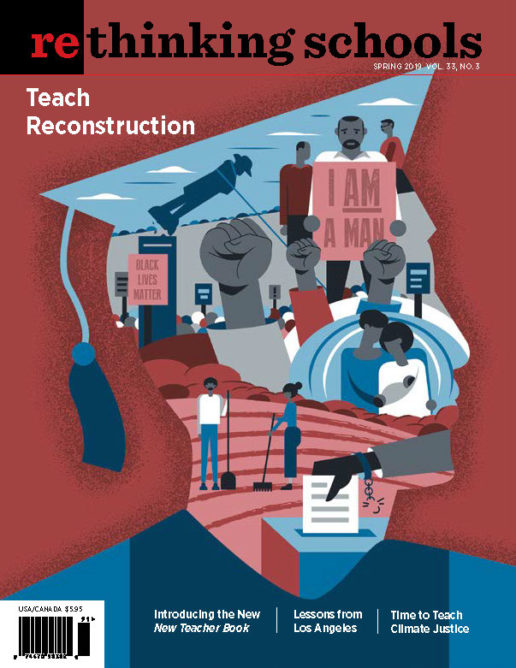Letters 33.3

Celia Jacobs
To the Editors of Rethinking Schools:
In the Fall 2018 issue, the article “The Importance of Goodbye: When Students Leave Midyear” spanned three pages and lamented the loss of three students. Ursula Wolfe-Rocca wrote that when she doesn’t speak of students who “belong to some of the United States’ most vulnerable groups” who leave midyear, she feels “dangerously complicit in reinforcing a social narrative that these lives don’t matter, that their education, their presence in our classrooms is expendable, inconsequential.”
I write this letter with a similar intent; I feel I would be complicit in the same social narrative if I don’t draw attention to the fact that teachers who work in urban, segregated schools lose so many students we cannot count them, let alone capture tidy stories of their goodbyes.
In the last recorded year, my school — 99 percent African American, 85 percent free and reduced lunch, a “vulnerable population,” as Wolfe-Rocca would say — had a churn rate of 38 percent, and we’re on track for similar statistics this year. I teach five classes, some of which have lost upwards of 20 students. And as I write this, it’s only November.
Saying goodbye is a luxury withheld from classrooms fractured by expulsions, transfers, absenteeism, incarceration, and, in the most extreme of cases, death. If it is dangerously complicit to refrain from telling the stories of three “vulnerable” students, it is downright life-threatening to exclude the stories of schools who bleed these students daily.
I don’t doubt the importance of goodbye; I doubt its feasibility in inequitable contexts.
Rose Peterson
High School English Teacher
Barack Obama School of Career and Technical Education
Milwaukee
Response from Ursula Wolfe-Rocca:
Rose Peterson makes crucial points that my article clearly did not make forcefully enough. I teach in a very specific context — a wealthy, suburban city in Oregon — and the stories I share about that context are not universal.
I am sorry that my piece felt like an erasure of the much more widespread disruptions that systematically assault schools like Ms. Peterson’s and make saying goodbye literally impossible.
Peterson suggests that the piece itself is indulgent, a kind of privilege, since it only captures the “tidy stories” of my three students, not “the stories of schools who bleed these students daily.” But those stories — the stories of Rose’s students — are not mine to tell. This was not a policy piece; it was an account of one teacher’s evolving classroom practice in a specific social location. But I could have done a better job emphasizing how deeply the racial and economic context of my school shaped the story I was telling.
* * *
To the Editors of Rethinking Schools:
I wanted to bring to your attention that there is an error in your transgender editorial (Vol. 33, No. 2 — Winter 2018-19). In the discussion of bathrooms, you correctly state that the Obama administration took the position that transgender students should be able to pick the bathroom of their choice. But then you go on to suggest that a solution to the Trump administration’s withdrawal of that policy is to designate gender-neutral bathrooms that can be used by transgender students.
In fact, the litigation over bathrooms (which spurred the Obama administration policy) involved students such as Gavin Grimm who wanted to use the bathroom that conformed to their gender identity and not a segregated gender-neutral stall. Grimm’s psychologist testified that it was important to Grimm’s gender transition to be able to use the boys’ bathroom rather than a gender-neutral bathroom that was otherwise used by staff.
The solution you propose is the one rejected by Grimm. My article on the subject, “Public Restrooms: Flipping the Default Rules” in the Ohio State Law Journal, provides a discussion of the history of the public restroom debate. I propose that all bathrooms should be “all comers” bathrooms. That proposal, of course, is far more radical than the one proposed by the Obama administration. But I don’t think Rethinking Schools should be endorsing the position taken by Grimm’s conservative Virginia school district.
It was great to see Rethinking Schools focus on the rights of transgender students and I really enjoyed Mykhiel Deych’s article. Thanks so much for your important work.
Sincerely,
Ruth Colker
Distinguished University Professor
& Heck-Faust Memorial Chair in Constitutional Law
Moritz College of Law
The Ohio State University
Columbus

